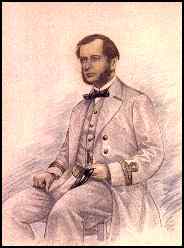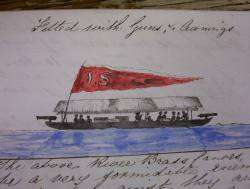George Truman Morrell
| George Truman Morrell | |
|---|---|
 Commander George Truman Morrell, RN | |
| Born |
29 January 1830 Dinan, France |
| Died |
7 May 1912 (aged 82) Belvedere, Kent, England |
| Allegiance |
|
| Service/branch |
|
| Years of service | 1842-1873 |
| Rank | Commander |
| Commands held | HMS Sparrow |
Commander George Truman Morrell RN (29 January 1830 – 7 May 1912) was a British naval, officer and explorer active during the Victorian era.
Early years
George Truman Morrell was born 29 January 1830 in Dinan, Brittany, France, a British subject. He was the second son of a naval officer, Arthur Fleming Morrell, and Elizabeth Reid, who was the daughter of a pay officer at the Plymouth Dockyard. His eldest brother, Charles Walter Morrell, died in 1839, aged 11.
His younger brother, Arthur Morrell, also born in Dinan became a Rear-Admiral in the Royal Navy.[1]
Career
George joined the Royal Navy in 1842 at age 12, a first class volunteer aboard HMS Calcutta, Captain George Frederick Rich commanding.
He would spend seven years as a midshipman, before becoming a mate aboard HMS Excellent in 1849. He was then acting lieutenant on several occasions, before being confirmed to that rank in 1851.[2]
In 1866, the Foreign Office reported on "great judgement" displayed by George during a daring expedition up the Niger River aboard HMS Investigator,[2] a journey he documented in his journal.[3]
During his naval career, George served aboard the following ships:[2][4]
- 1842, HMS Calcutta
- 1842-1843, HMS Monarch
- 1843-1845, HMS Aigle
- 1845, HMS Formidable
- 1845, HMS Siren
- 1849, HMS Excellent
- 1849-1850, HMS Phoenix
- 1850-1851, HMS Helia
- 1851-1852, HMS Philomel
- 1852-1853, HMS Daring
- 1853-1856, HMS Imaun
- 1861-1865, HMS Wellesley
- 1865, HMS Espoir
- 1865, HMS Investigator
- 1865-1866, HMS Sparrow
- 1866, HMS Espoir
- 1866-1867, HMS Wellesley
- 1867, HMS Fisgard
- 1867-1868, HMS Wellesley
- 1869-1873, HMS Trafalgar
He was paid off from the navy in 1869, and then served for a short period with the coast guard in Sligo, Ireland, as a division lieutenant. He documented his final year of service in Ireland in another journal, filled with details such as the loss of ships and crew, the recovery of drowning victims ("30th June - Bodies of two young women aged about 16 & 18 both sweetly pretty, laying in our boat house, having been brought off Black rocks near L. House on Saturday, to await coroner's inquest on Monday, 30th June"), and discipline meted out to coast guardsmen ("Sept. 9th - Mr. King to lose one good conduct stripe").[5]
Marriage and family
George married Ellen Mary Stretton (born c. 1835, died 21 December 1903), of Islington, in a ceremony on 29 August 1861, at St Michael, Highgate, Middlesex.[6] The family was mainly settled in Kent, however his son Patrick was born in Dublin, Ireland, during his service in the coast guard.
Together, they had several children. They were:
- Arthur Wellesley Morrell, who also joined the Royal Navy, becoming a Paymaster Captain
- William George Henry Morrell, another naval officer
- Rosa Elizabeth Morrell
- Douglas Henry Morrell, another naval officer, who died in 1903
- Alice Fanny Morrell
- Maud Lucy Morrell
- Patrick Frank Arthur Morrell, later a vicar
- Edith Georgina Morrell
- George Edwin Morrell
- Frank Alfred Morrell
George lived in Belvedere, Kent, at the time of his death on 7 May 1912.[7]
Niger River Expedition
In late 1865, George, who was then a lieutenant, was given command of HMS Investigator, a steam-powered, flat-bottomed British navy gunship. He spent the next several months steaming the ship up the Niger River, bringing gifts from the British government, in Queen Victoria's name, to tribal kings and elders along the river.
During the voyage, George mediated a dispute between British colonists and Obi Akazua, who reigned amongst the people at Onitsha, Nigeria. He observed first-hand the slave trade, which flourished locally despite the cessation of the trade throughout most of the western world.[3]
He recorded his interactions in a handwritten diary, including coloured illustrations of aspects of contemporary West African life along the river, such as this drawing of a brass canoe fitted with an awning and armed with cannons, used for local trade along the river.[3]

External links
References
- ↑ Hesperides (2007). The Annual Register - A Review of Public Events at Home and Abroad for the Year 1915. Read Books. p. 165. ISBN 978-1-4067-5197-0.
- 1 2 3 The National Archives. ADM 196.
- 1 2 3 Morrell, George Truman (1865). Journal of the Niger Expedition (Unpublished manuscript).
- ↑ Morrell, George T. Log No. 1 G. Morrell Volunteer 1st Class (1842-1845). Unpublished manuscript.
- ↑ Morrell, George Truman (1873). George T Morrell, Sligo, January 1873, Div. Lieut., Coast Guard, Rosses Point (Unpublished manuscript).
- ↑ The National Archives. ADM 13/70. Supplementary Records, Marriage Certificates
- ↑ "Obituary: Commander G. T. Morrell". The Times. London. 9 May 1912.
Other sources:
- 1881 British Census, Kent